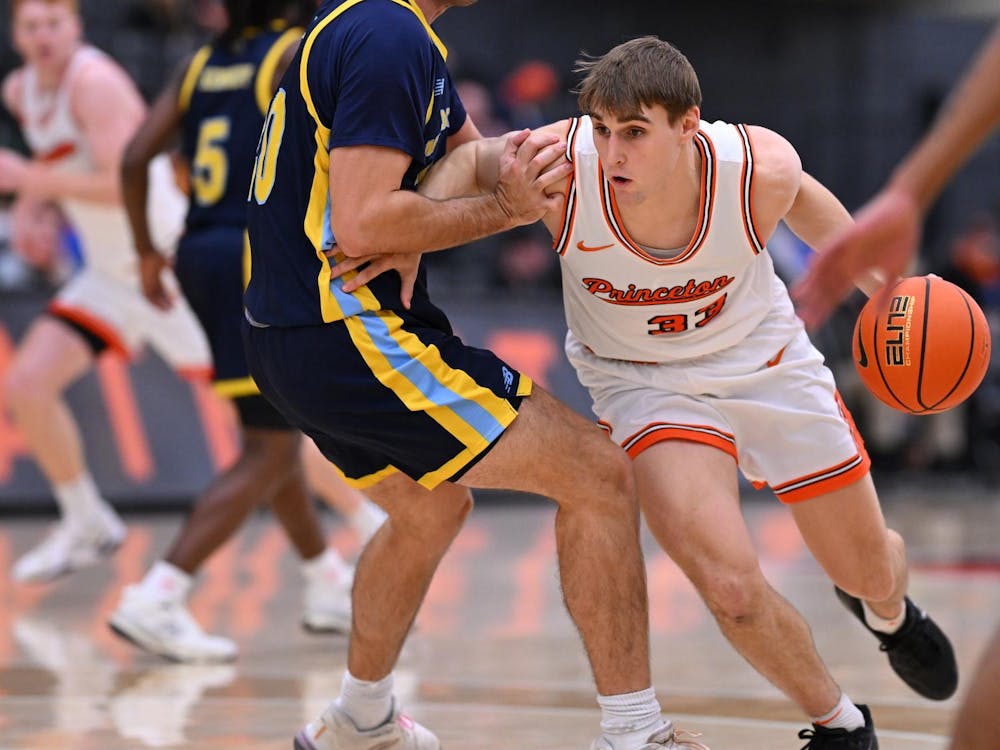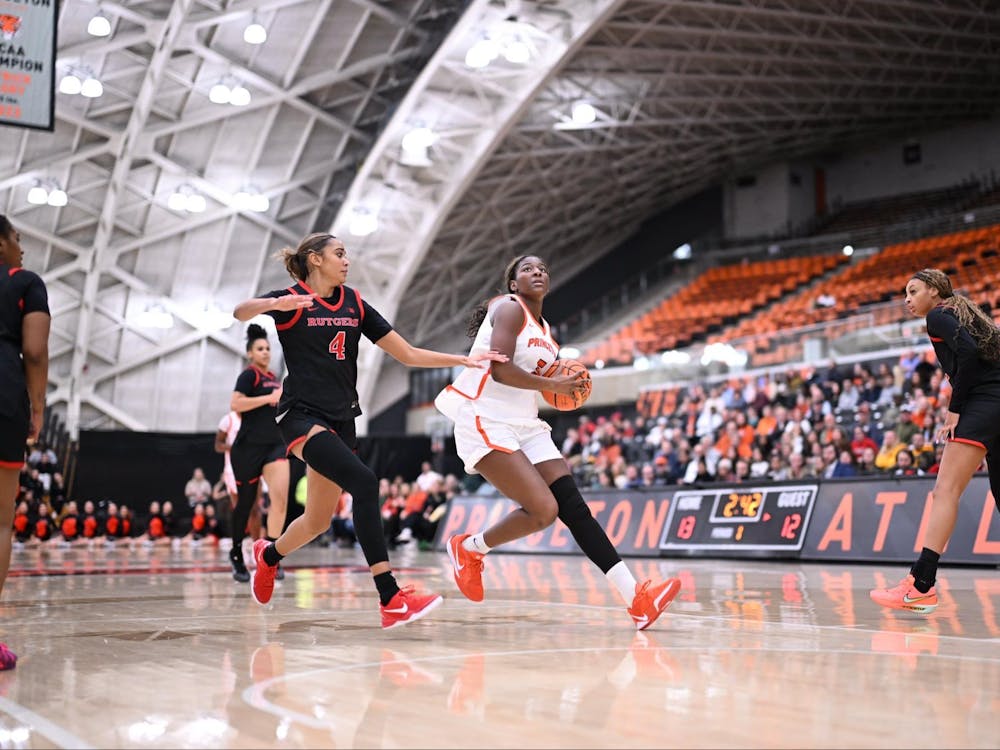At the end of the 1999 football season, Princeton’s squad was in crisis. The Tigers had just finished the year 3-7 overall and only 1-6 in the Ivy League, their worst finish since 1973’s infamous 1-8, 0-7 team. Head coach Steve Tosches had been in charge longer than some players had been playing the sport, and his last four seasons had been disappointing.
It was time for a change. That’s where Roger Hughes came in.
Tosches had compiled a 78-50-2 record overall in his 13 seasons at the helm but had gone only 17-23 since 1995. In 1999, the Tigers finished last in the league, tied with lowly Columbia, which now has not had a winning season in 13 years.
The team’s offense had been struggling, putting up more than 30 points in only six games over its past four seasons. Tosches was out, the Department of Athletics decreed, and Hughes, Dartmouth’s offensive coordinator, was in.
Since 1992, Hughes had been coaching at Dartmouth, where he won two Ivy League championships and beat Princeton five times before trading his green for orange and black. He began his coaching career in 1982 at Doane College in Nebraska — his alma mater — before taking jobs at the University of Nebraska, the University of Wisconsin-Whitewater and Cameron University in Oklahoma.
Impressed by the success Hughes experienced during his nearly 20 years of coaching experience, Director of Athletics Gary Walters ’67 decided he was the man for the job.
Now, after 10 years as a Tiger, Hughes is out, and Walters is looking for his replacement.
Ten years ago

The year before Hughes was hired by Princeton, his Dartmouth team beat the Tigers, 19-18. At that point, Princeton had only beaten the Big Green once since 1995. That year, though, Tosches’ Tigers finished 78th in total offense, out of 122 teams in what was then called Division 1-AA. Under Hughes, Dartmouth’s offense was 112th.
Indeed, when Hughes was announced as the new coach, it came as a surprise to many fans. Among the other rumored candidates were two from the National Football League: former New York Jets head coach Al Groh and then-Arizona Cardinals quarterback coach John Garrett ’88.
But moving past the initial shock, many players were happy to see Hughes come in, as some felt Tosches had overstayed his welcome.
Mike Higgins ’01, a captain and middle linebacker during Hughes’ first year at Princeton, was very optmistic about the change heading into his senior year.

“Coach Tosches had been [at Princeton] for a relatively long period of time,” Higgins said. “He had his fair share of wins and did a fairly good job with the program, but at some point, coaching is a tough business. And when you get stuck in a rut, people want a change.”
“When [Hughes] came in, he brought a new life to the program,” Higgins added. “I think that our spirits as a team were down after having a couple rocky years. So Coach Hughes came in with a positive attitude and a clear vision for where he wanted to go with the team and a lot of energy.”
“The players took to him right away,” he noted.
In Hughes’ first year with the Tigers, Princeton finished fifth in the Ivy League, a step up from the previous season but a long way from the ultimate goal. Still, Higgins said the first year was a positive one that set the Tigers up for long-term triumph.
“Our senior year I would consider a success, for the very fact that we changed the momentum,” he said. “For the next couple of years, you could see the momentum start to build and culminate in the Ivy championship a few years later.”
Hughes’ first two years were not particularly successful, with three wins each season and a last-place finish in the Ivy League in the second one. But the team upped its win total to six in 2002. That year, the Tigers started the season 4-1 before dropping three of their last five, the losses coming to Princeton’s three biggest rivals: Harvard, Yale and Penn.
In 2003, the downward spiral continued, as Princeton finished 2-8, beating only Brown and Cornell while losing to Yale in overtime and Harvard in double-overtime.
At that point, though, the tide started turning for the Tigers, who finished the next season at .500 before Jeff Terrell ’07 took over as the quarterback in 2005. In Terrell’s first year under center, Princeton finished 7-3, good enough for second in the league.
In 2006, Hughes finally broke through for his first — and only — Ivy championship, as Terrell piloted the Tigers to a 9-1 season, the only blemish coming in a loss at Cornell. The Tigers shared the title with Yale, and Terrell was named the sole Ivy League Player of the Year.
Following that season — one of the Tigers’ best since the legendary 9-0 team of 1964 took the field — Princeton came back down to earth with the first of three straight 4-6 campaigns in which the Tigers finished fourth in the League.
Then, less than 24 hours after his Tigers finished this season with a win at Dartmouth, Hughes’ career as Princeton’s coach was over. In the past 10 years, he compiled a 47-52 overall record and a 35-35 league mark.
Looking back
In November interviews, former players expressed mixed views of Hughes as a coach.
Higgins, for one, said he has been following the team in recent years and was largely positive about Hughes, especially given the difficulties the team faced this year. Indeed, when star senior running back Jordan Culbreath was sidelined with an injury and diagnosed with aplastic anemia this fall, the squad was dealt a significant emotional blow. Furthermore, at the end of the season, the Tigers had 27 players on their injured list.
“I’d say I was very encouraged by the state of the program … Looking after the last couple of years, they’ve been tough,” Higgins said. “It didn’t seem like it clicked in the last couple years, and then you look at a year like this — we were really sluggish coming out of the gates, [and] then you throw in the emotional component of everything that happened to Jordan.”
“I think [Hughes] has done a great job with the program for the last 10 years,” he added.
Senior linebacker and co-captain Scott Britton said that one of Hughes’ major strengths was his presence off the field. “He was definitely a great ambassador for Princeton football and somebody I considered a great man,” Britton said. “He really taught us a lot about the manner in which we should conduct ourselves as players and as people.”
Hughes spent most of his time on the field coaching the offense, but he was always “approachable, which was really nice as a player,” Britton explained.
“If you had something you needed to talk to him about, his door was always open,” Britton added. “He was extremely fair, which I think was important.”
Terrell, who spent time on two NFL rosters after his graduation, voiced similar thoughts about the coach, noting that Hughes was “relational” and a “great face for the program.”
“He was motivational in his speeches, he was a student of the game, and he was always looking to learn more,” he added. “You always knew he was giving everything he had, which was an awesome feeling as a player.”
On the other hand, Bill Foran ’08, who played on the Ivy championship team in 2006 and led the team as its quarterback in 2007, was less positive about the Hughes era, calling the firing “a step in the right direction for the football program.”
“Coach Hughes only had three winning seasons during his 10 years as a head coach, which should not be acceptable at an institution like Princeton,” he said in an e-mail. “We should expect to consistently compete for the Ivy League championship year in and year out.”
In an interview, Foran explained that Princeton’s players have been and are talented enough to beat many of the teams the Tigers have recently lost to.
Other players who wished to remain anonymous said Hughes had a penchant for superfluous micromanagement.
A football head coach is particularly important to the overall operations of the team, Foran noted. Therefore, “bringing in a coach with a history of success and a track record [is important],” he explained.
Walters, meanwhile, simply said in an e-mail, “The department is now moving forward to identify and select a worthy successor,” responding to request for comment.
Few of the statistics from the Hughes era are particularly encouraging. In his 13 years, Tosches amassed three Ivy titles and coached four Ivy League Players of the Year, while Hughes finished his tenure with one each, both coming from the 2006 season.
With Terrell under center, Hughes led the team to a 16-4 run over the 2005 and 2006 seasons, culminating in the program’s first Ivy championship in 11 years.
But Hughes’ .474 winning percentage is the sixth worst ever for a Princeton coach, and his record without Terrell at the helm was 31-48.
Still, though Hughes-coached teams only won two games against both Penn and Harvard, they did put together winning records against Columbia, Cornell and Hughes’ former team, Dartmouth.
In this past season, the Tigers suffered their worst-ever defeats to long-standing rivals Columbia and Harvard, in addition to losing to Penn by 35 and The Citadel by 31. The Tigers also lost to Brown and took No. 20 Colgate to two overtimes before succumbing.
The Tigers’ wins came in an ugly battle at Lehigh, a struggle over Cornell at home, over Dartmouth in New Hampshire and, most prominently, over Yale in Princeton. Winning three of its last four to finish with a 4-6 record for the third-straight season was not enough for Princeton and, ultimately, not enough for Hughes.







